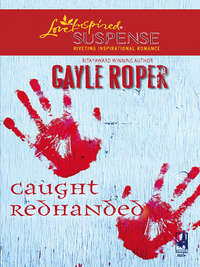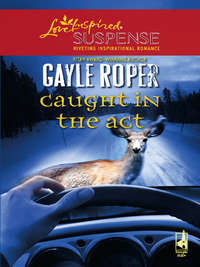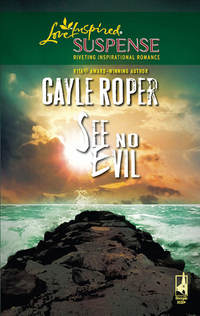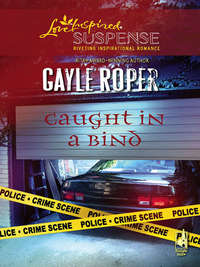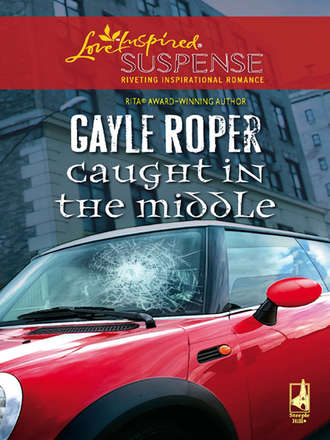
Полная версия
Caught In The Middle
Sergeant Poole nodded. “Did anything else significant happen today?”
I realized that, in place of my cuticles, I was playing with the string from my sweatshirt hood. I tucked it inside so I couldn’t fiddle with it anymore and said, “I almost had an accident on my way home when some guy pulled out in front of me over on Oak Lane. But I didn’t.” I paused, thought, then shrugged my shoulders. “That’s it.”
Sergeant Poole chewed the tip of his pen for a minute, wrote something down, then asked, “Does the name Patrick Marten mean anything to you?”
“Patrick Marten?” I thought for a few minutes, then shook my head. “I don’t know anyone by that name. Why? Is he the man in the trunk?”
Sergeant Poole nodded.
Patrick Marten. I sighed. Was there a Mrs. Patrick Marten somewhere waiting for him to come home? Were there kids? Certainly there was a mother and a father. A girlfriend? Obviously there was an enemy.
By the time Sergeant Poole capped his pen and hefted himself to his feet, I was feeling more normal. I almost smiled as the gaps in his shirt slid shut. After all, I was used to talking with people in living rooms. It was just corpses in the rain that bothered me.
And I had finally realized that I was in the middle of the biggest story of my fledgling journalism career.
“I’m sure we’ll be talking again, Miss Kramer.” Sergeant Poole pulled on his still-dripping slicker. “Maybe tomorrow when you stop in to sign your statement.”
“Whenever you want, Sergeant Poole.”
He stopped and turned at the door. “By the way, we’re going to have to impound your car for at least a few days.”
I stared in consternation. “My car?” How could I investigate a murder without a car?
Don spoke for the first time. “I’ll pick you up tomorrow morning, Merry, and take you to one of the local car dealers who leases as well as sells. We’ll charge it to The News.”
I nodded as I almost pushed Sergeant Poole out the door. What other unforeseen complications hunkered down just out of sight, eager to pounce?
But who cared about complications? I had a story!
“Don,” I began.
“Yes?” His voice was full of suppressed emotion. If I didn’t know better, I’d have thought he was laughing at me.
I glared at him. “You don’t even know what I’m going to say.”
“Of course I do,” he said. “I sat on your sofa and watched you go from scared victim to professional reporter. You want to cover this story.”
“You bet I do! It’s the story of a lifetime, and I’m the perfect one for it! Who better?’
“Do you think you can handle it?”
“Can I handle it? Of course I can!” I was too excited to be mad at the suggestion that I couldn’t.
Don grinned at me as he patted his carefully barbered graying hair. Everything about him was neat and precise, even the tidily folded scarf resting on the chair back. He shook it out and draped it about his neck, making sure the ends were even.
“To be honest, as soon as I heard the call on the police scanner at the office, I knew we had a winner. If you have any trouble as the story develops—” He held up his hand at my indignant look. “If you have any trouble, Mac can help you.”
Don took his mug to the kitchen, and I heard him rinse it out. I stood in the middle of the living room and grinned like an idiot. I had a story!
I made myself act professionally as I walked Don to the door. I even made a pretty speech. “Thanks for being here when I talked to Sergeant Poole, Don. Something about a policeman always makes me feel guilty even when I’m innocent, which is all the time—except for the time I got a speeding ticket for going forty-five in a twenty-five mile zone.”
Don laughed. “You’ve got nothing to worry about, Merry. I’ll vouch for your character if they ever begin to suspect you.”
“And my whereabouts,” I said, suddenly remembering Don eating spaghetti at Ferretti’s, talking intently with some unknown man. I hadn’t approached him because the two of them looked so involved. In fact, I deliberately sat with my back to him. “That is, if you saw me like I saw you.”
Don hesitated, then shook his head. “No, I don’t think so.”
I shrugged. “Oh, well, I doubt it matters. Thanks again for being here.”
I watched him drive up the alley, then locked my door carefully. I washed my mug and Sergeant Poole’s and decided there was no way I was going to take the trash out. I didn’t care that the police were still in the parking area. I was in for the night!
I checked and rechecked the doors and the windows, the tall, breakable windows that suddenly seemed less wonderful than usual. It was when I tested them for the fourth time that I noticed the moon peeking through the running clouds. The storm was over.
I got into bed with Whiskers and plumped the pillows carefully against the headboard. When I leaned back with my lined pad on my lap, Whiskers promptly climbed onto the pad.
“Not now, baby,” I said, lifting the heavy creature and setting him down beside me. “I’ve got to write everything down before I forget it. Who knows?” I grinned at him. “Maybe I’ll even write a true-crime book about this someday.”
Whiskers yawned hugely, and I tickled him beneath the chin. I had selected him at the pound because he kept coming to me to be petted, purring whenever my hand even reached toward him. Now he lay close against me, a comforting presence after an unbelievable night.
I turned to my pad, feeling ghoulish as all my journalistic juices flowed and excitement coursed through me—now that I didn’t have to look at the body again. Admittedly, what had happened was a great tragedy, especially for Patrick Marten. But a great story is a great story and deserves to be written about, I told myself hard-heartedly. In all great stories people suffer. If I could just get the information together, find the motive, the means, and the murderer, certainly I would reduce the suffering for Patrick Marten’s family and friends. If Don was hugely impressed with my work, that was just a small extra.
Satisfied that I had manipulated my motives well, I wrote:
1 Took car to Mr. Taggart’s. Spoke with him for a few minutes about its tendency to overheat.
2 Jolene picked me up. She never got out of her car. We were five minutes late for work.
3 Spent the morning opening mail and running dumb errands for Don and Mac. Felt trapped without my car.
4 Went to the mall in Exton with Mac to look for a camera over lunch. He made a pass. I rejected it. He asked me out. I said no. We laughed. I don’t think he’s mad even though he’s famous for his grouchiness. Certainly he’s not mad enough to put a body in my trunk. I bought the automatic-focus digital camera he recommended, which pleased him. I’m now broke.
5 Mac dropped me at Premier Medical, the new private emergency service, for an interview. Spent an hour with Drs. Mitchell and Wenger. Learned lots of new terms and used my new camera. The pix look good.
6 Called a taxi. Went back to the paper. Did telephone interviews with the head nurse at the hospital’s trauma center and with three doctors in private practice. I really ought to find a doctor. What if I get sick?
7 Wrote up the story. Gave it to Don. He didn’t moan too much.
8 Walked to Mayor Trudy McGilpin’s office to observe a meeting between her, the water authority people and the recreational people. The meeting was canceled because Trudy’s sick. I walked back to The News. Is Trudy as good as a lawyer as she appears to be as a mayor? How old is she? Forty?
9 Since I had no meeting to write up, I left much earlier than I’d planned. Jolene, the chatter queen, dropped me at Taggart’s at about 5:20.
10 Got my car. I saw no one at all at the garage. I just took the car and left.
11 Stopped at Ferretti’s Ristorante for some spaghetti. Delicious. Saw Don but he didn’t see me. Did the Philadelphia Inquirer crossword puzzle while I ate. I couldn’t decide whether I’m still lonely or not—which I guess is a good sign.
12 Went to the Board of Education meeting at the high school and arrived on time! High drama when the man in charge of the athletic committee started yelling at the woman in charge of the curriculum committee because she wanted too many books and accelerated classes. She will ruin the school and the budget that way, he said.
13 Left the high school about 10:25.
14 A wild ride home. Almost hit a man on Oak when some guy pulled out in front of me. What if I’d had an accident with that body in the trunk?
15 Got to my apartment about 10:45.
16 Found Patrick Marten at 10:47.
17 Got the shakes at 10:49.
18 Cops arrived at 11:05.
19 Questions:
Was the body in the trunk when I got the car at the garage? It must have been.
Who put it there? Mr. Taggart? A nice old man like him?
Why did someone put it in my car? Because he/she doesn’t like me? No one around Amhearst knows me well enough yet to dislike me. And no one’s ever disliked me like that my whole life.
Or maybe he/she doesn’t like The News? But who would know that my car was the car of a News reporter? There’s nothing written on the doors or anything.
Maybe it just happened because the car was handy? That means it was someone at Taggart’s, doesn’t it? Or was it someone driving by who happened to need a place to get rid of a body? It was dark even before I got there. Winter solstice approaching and all that. He could have just dumped Patrick and run. But how did he get the trunk open? My extra set of keys was locked in the car. Did the murderer lock the keys in the car after he left Patrick, and I just assumed Mr. Taggart put them there?
A huge yawn interrupted my note taking. I didn’t bother to smother it even when Whiskers looked at me askance.
I glanced at my clock—1:45 a.m. I groaned. Morning would be here all too soon. I turned out my light and lay down. Whiskers came to sleep in the depression between my shoulder and the pillow.
I closed my eyes and saw a man in a green jacket lying on cases of soda. Instantly I was wide-awake, afraid to close my eyes again. I stared unhappily at the ceiling and jumped every time Whiskers moved.
“Stay still, baby,” I said, scratching his ears. He purred happily and began grooming himself. The bed shook with each slurp.
I put my hand between his tongue and body. “Not now, Whiskers.”
He purred again and began licking my hand. I pulled away from the rasping wetness, and the cat continued on his paw without missing a beat.
I sighed. The sensible thing would be to kick the animal out of bed, but much to my surprise I felt a strong need for his warm presence.
I reached out and turned on my light. In the brightness, my shoulders relaxed, and the world righted itself.
I looked around carefully, finding exactly what I knew was there: nothing. I lay back and flicked off the light again. I turned it back on immediately.
“Don’t tell anyone,” I told Whiskers as he blinked at the brightness, “but we’re sleeping with the light on.”
THREE
Last night’s storm had indeed blown itself out to sea, leaving behind a thin coating of ice that caused a one-hour delay in school openings and a massive slowdown for morning commuters.
True to his word, Don picked me up and took me to arrange for a rental car. He solidified his place in my heart when he said, “Charge it to The News.”
“I need your piece on the murder by nine,” Don said as we left the car dealer. “Make it personal, real human interest. Mac will write a parallel news piece. You’ll both be front page.”
I nodded. The News was a twelve-to sixteen-page afternoon paper, which meant we scheduled news deadlines at nine, editing deadlines at ten, and it was printed and ready for delivery by noon. Don took personally any news that broke between ten and three because it couldn’t make the paper, yet readers expected to see it there.
“The Board of Education stuff?” I asked.
“Anything scandalous?”
“Just fighting over where to spend the money.”
He nodded. “So what else is new? Write it up for tomorrow. And don’t miss that interview with that artist.”
I groaned inwardly. A personality puff piece was the last thing I wanted to do now.
“Hey, his upcoming exhibit is going to be a big civic occasion.” Don apparently detected my mood. “Mayor McGilpin would be very unhappy if we overlooked it. Got to show Amhearst in a good light, you know.”
I nodded, grinning. “Especially after a murder.”
Don grunted. “And give me another human-interest piece for Friday about the murder. Interview the family. Find a wife or parents or brothers or sisters. Find out what a wonderful guy he was or what a louse he was. Is he local? If so, find teachers and old friends. If not, find out how he came to be here in Amhearst.”
I nodded again. Three angles or points of view, an old reporter had told me when I first started working back in Pittsburgh. For any human-interest story or information piece, find three perspectives on the story to give it enough depth. Parents, teachers, friends? Wife, employer, brother? His past, present and lack of future?
Of course, those interviews would have an emotional cost, both for those who had cared about Patrick Marten and for me, but I put that thought out of my mind as soon as it appeared.
I drove my rental to the office, thankful for a heater that worked quickly, because the sun, though shining brightly, had little warmth. I scanned the clear blue sky when the radio weatherman announced that another storm was due tomorrow. Chicago was already snowed under, he reported in the cheery voice of a committed skier, and the formidable flow of frigid Canadian air showed no signs of weakening before it reached the East Coast. I could practically hear him rubbing his hands together in anticipation of driving to the Poconos over treacherous roads for the thrill of throwing himself down mountains on strips of wood or whatever composites skis were made of these days.
I should live in Florida or Arizona so I need never be cold again. Even if I stayed in Pennsylvania, I had promised myself I would be intelligent about it and never, ever, ski.
Finally I settled down at my desk. Murder, I typed, is a distant crime that involves other people. Last night, to my utter surprise and distress, it involved me.
I looked at my CRT and reread my opening. Don was a stickler for a hard lead on news pieces, the traditional, journalistic inverted pyramid of who, what, where, when and why. But he seemed at ease with soft leads on special pieces like mine was to be. One thing was certain: he’d tell me if he was unhappy.
I had my copy on his desk before nine, and then I gave my mom a quick call. It was only a matter of time before she and Dad heard about last night, and I thought they should hear the story from me.
“Merry! Oh, Merry!” Mom was predictably distressed.
“I’m fine, Mom. I’m absolutely fine. And safe. Believe me.”
There was a small silence, and I could hear her skepticism zip clearly across the miles from Pittsburgh to Amhearst.
“Well, I’ve got to go,” I said quickly. “I’ve got an important interview.” And I hung up.
Sighing, I forced myself to begin planning my interview with artist Curtis Carlyle. I could hardly resist smiling every time I said his name. It was too perfect to belong to anyone other than an artist or a movie star or some other arty, public person. Had his mother been prescient, or did she just like alliteration? Was he named after a rich uncle, or had he made up the name to create a persona?
As I jotted my notes, I thought how incredible it was that I should do something as bizarre as find a body one night and something as routine as interview some local artist the next morning. Variety like this was one of the reasons I loved newspaper work.
Curtis Carlyle. Artist. Watercolors. One-man art show scheduled for Friday night and Saturday in the Brennan Room at City Hall in Amhearst. Chester County scenes his specialties, notably winter scenes with old stone barns and houses, wonderful skies. Former gym teacher. Still coached high school soccer and tennis.
Usually interviews intrigued me, and I looked forward to them. Finding out what made people tick was like opening locked doors. Always a new room appeared, and sometimes unexpected treasure. Today’s was an exception. How could an artist—even one with a name like his—compare with a murder? I found myself wishing I could skip him and get back to my murder investigation.
The last of the ice was melted by ten in the morning when I pulled up in front of Curtis Carlyle’s house, odd puddles the only reminders of the bad weather.
I studied the brick-faced ranch, looking for clues about its occupant. It looked much like the other houses in the neighborhood, not the retreat of an artist of some stature.
Thin sunlight patterned the roof through the barren branches of the beech and poplar that formed a semicircle around the lawn. Brown, frosty, winter-killed grass tufted the deep front yard. On the half acres to the right and left were other ranches very similar in appearance. Across the street a pair of three-year-olds made fat and unbendable by their snowsuits stared at me from the porch of yet another ranch.
I looked again at Carlyle’s house and shrugged. It told me nothing.
I rang the bell and waited. No response. I rang again as I checked my watch. Ten o’clock. That was the time we had agreed on. Could he have forgotten? Sure, he was probably busy with last-minute arrangements for his show, but I was as important to him as he was to me. If I could tear myself away from a murder investigation to make time for him, certainly he could return the compliment. After all, he needed the exposure as much as I needed the article.
I rang a third time. Maybe he was hard of hearing. It seemed to me that anyone who retired from teaching must have lost something through the years of dealing with kids. I would have thought it would be sanity, but hearing was a distinct possibility.
Suddenly the door imploded and a huge bear of a man filled the opening. A great smile lit his face, crinkling his eyes to slits behind their dark-framed glasses.
“Merrileigh Kramer from The News, right?” he asked as he threw the storm door open for me. “Hi. I’m Curt Carlyle.”
I nodded as I stepped by him, quickly revising my erroneous preconceptions. “Former gym teacher” obviously didn’t mean what I had thought. Curt Carlyle was no retiree; he was a man in his early thirties who exuded energy, whose mass of curly dark hair was a far cry from the sparse gray I had anticipated.
“Do you mind if we talk downstairs?” he asked. “I’m finishing up some things for tomorrow.”
He led the way downstairs and as we descended, he began to whistle “Row, Row, Row Your Boat.” I grimaced.
Unexpectedly, a huge, bright room greeted me. The rear wall of the walkout basement was exposed by the downward slope of the lawn and had been lined with glass. The lemon light of winter was aided by great lights hanging over Carlyle’s worktable. Shelves lining the front wall of the room were filled with art supplies from paper and paints to huge rolls of popcorn plastic used for packaging. It was a roll of the wrap that he was working with now, swathing a framed picture four feet by three for safe transport.
I pulled out my new camera and began snapping him as he worked. He was happy to pose at his worktable and stood easily beside a wonderfully detailed watercolor of a stone barn backed by a brooding, stormy sky, dark clouds streaked dramatically with the brilliant oranges and yellows of an angry setting sun.
“This is the original of the picture I’m offering prints of this year.” He wiped an imaginary speck off the glass before he began wrapping it in plastic. “I select one picture a year to reproduce, and I’ve been pleasantly surprised at how successful the prints have been.”
“How many prints do you make?”
“Five hundred. Each numbered and signed.”
“I know you’re a former gym teacher,” I said. “How did you end up being a watercolorist?”
“I’ve always loved painting, but it didn’t seem like a very practical way to make a living. So I went with my other love, sports, and taught. In my late twenties I became very dissatisfied. I had visions of me rolling out the ball for the rest of my life while others played.”
I imagined him stalking the sidelines like a tethered grizzly, frustrated and unhappy.
“My sister, Joan, was the one who encouraged me to take the leap.” He nodded toward the portrait of an attractive woman I had assumed to be a wife or girlfriend. “So what if I had a couple of lean years, she said. I had only myself to feed. Our parents had left us this house, and since Joan was married, she urged me to live here and go for it.” He shrugged and grinned happily. “I did, and though I’ve been hungry a few times, I don’t regret it. Life’s exciting again.”
“Your sister must be very proud,” I said.
His smile disappeared. “I’m sure she would be, but she died two years ago, just before things really started to move for me.”
“Oh. I’m sorry,” I said.
“Don’t feel bad, Merrileigh. It’s okay. She was a strong Christian, and that thought comforts me.” He smiled and began to whistle again.
I listened to him for a minute, then said sharply, “Do you know what you’re doing?”
He looked at me in surprise.
“You’re whistling,” I said.
“I beg your pardon?”
“Everyone does it, and it drives me crazy.” I tried not to grind my teeth. “Though most people usually sing.”
“What in the world are you talking about?” Curt asked.
“What were you whistling?” I demanded.
He thought a moment. “‘Merrily We Roll Along.’”
“Right. And what were you whistling when we came down the steps?”
“I don’t know,” he said patiently. “What?”
“Row, Row, Row Your Boat’!”
Curt looked at me as though I were unstable.
“It drives me wild,” I said. “Sometimes I’d like to strangle my mother.”
Suddenly Curt’s face cleared and he began to laugh. “Merrily/Merrileigh, right?”
I nodded. “Most people do it subconsciously, though some people actually do it on purpose just to bother me.”
Jack had been one of those people, and I’d never understood why he intentionally did something I disliked so much.
“It doesn’t matter whether you think I’m overreacting or not, Jack,” I said to him once. “Just please believe me when I say I hate it!”
And he’d smiled his knee-weakening smile and sung back to me to the tune of “Row, Row, Row Your Boat”: “Calm, calm, calm yourself. Don’t get so upset. Merrileigh, Merrileigh, Merrileigh, I don’t like to see you fret.”
I looked stormily at Curt Carlyle, who smiled unrepentantly back.
“I’ll try to resist,” he said. “If I do slip, tell me, and I’ll shape up right away. Do people call you something besides Merrileigh to help then deny the word association?”
I was suddenly embarrassed about my outburst and how childish I sounded. It must have been last night’s shock.
“People usually call me Merry,” I said, and sighed. “I’m sorry, but if you’d lived with those songs every day of your life since the teacher first called your name aloud in kindergarten, you’d have developed a complex, too.”
“I’m sure I would have,” Curt agreed amiably.
He seemed to be studying me. My hand went to my spikey hair, but it stuck out above my head as it should. I glanced down at my gray slacks, jade sweater and navy blazer. They weren’t covered with Whiskers’s hair, so they looked all right to me. I sucked discreetly at the gap between my teeth. I hadn’t eaten anything since I’d brushed, but I always worried since the spinach-in-the-teeth fiasco eight years ago. I cleared my throat self-consciously.
“Don’t I know you from somewhere?” Curt asked.
I lifted an eyebrow and looked at him in surprise. “Isn’t that line a bit old?”
“I’m not giving you a line,” Curt said earnestly. “I honestly think I know you from somewhere.”


